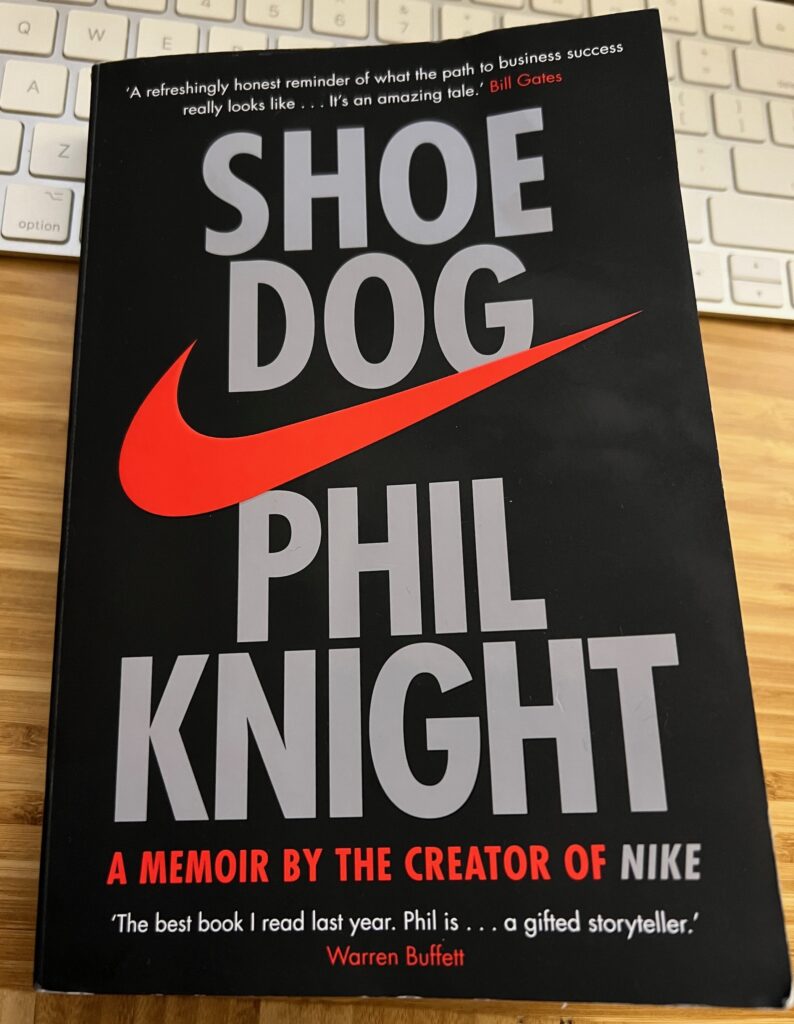
Finished this classic memoir by Nike’s founder – I highly recommend it to anyone interested in business, startup and popular culture in general.
Some interesting facts & entrepreneurship lessons:
- The early Nike team certainly didn’t take themselves too seriously. The spirit was rebellious, competitive but also very down to earth. Most of the early employees called each other fun or terrible names, with the stated purpose of keeping themselves honest. One nickname, ‘Buttface’, notably stuck. In fact, their early leadership retreats were called “Buttfaces”. Clearly it wouldn’t work with today’s sensitivity, but it’s a testament to: Embed a practice or regular reminder that nothing is sacred.
- A great company is built through amazing people: Knight was lucky to have so many of them in the early days. Bowerman was designing soles and experimenting them directly on his athletes’ feet, and inspired by breakfast built a waffle sole prototype with his home waffle iron (it made its way in the Natural museum of American history). Johnson was so relentless, dedicated and obsessed, creating the first running community, building his own private CRM on paper, even dreaming up the company’s name, and writing hundreds of daily letters to Knight that were never addressed. Woodell reinvented his career after a life changing accident took him from sports, leading business operations from his wheelchair, with pigeon poop falling on his office desk on a regular basis. Penny was holding it all together while being a wise and patient partner, building the team spirit and so much more… Everything is easier with top talent.
- Knight had a ‘crazy idea’ in college, took a traveling break and started by importing and reselling Japanese Tiger shoes while working as an accountant. A sophisticated business plan! Only years later, when Onitsuka tried to cut his supply off, and when faced with an existential threat, Nike was really born. Started as ”Blue Ribbon”, with made up offices to give a perception of solidity, years later Knight wanted it to change to “Dimension Six”. Thankfully the team won the debate and Nike was picked. There’s no recipe, and everyone figures out as they go along.
- The company was about to fail innumerable times. Early banks refusing to do business with them and withdrawing credit (calling an FBI investigation due to low equity & business growing too fast – how vastly different vs now!), competitors trying to destroy them through old regulations & regulatory capture, unhappy ‘bureau-krakens’ feeding on its success, dangerously empty bank accounts.. the story is filled with near catastrophic moments. The most memorable is when for a few days all their checks bounced, Nike couldn’t pay staff and suppliers, leading to visits from angry creditors. The team’s plan? Allocate a team member to each creditor, arrange meetings in distant rooms, and play a dangerous sliding doors game to make sure no two creditors could ever meet each other in the office. I wonder how many businesses weren’t that lucky and we’ll never know their stories. Many forces will conspire to make you fail. Luck has an incredible role – the greats increase its surface area.
- Knight was passionate about war history. He recalls the origins of tycoon from the Japanese word taikun “warlord” (not exactly, but doesn’t matter). Maybe business is the way to take a dangerous innate push to fight each other and channel it into something meaningful and productive for society. “Business is war without bullets”.
- He also admired Sony, referencing to it as the Apple of his day. I guess many soon admired Nike, until younger and smaller companies came and took their place, repeating the cycle. Interestingly, running was a small niche community in the 60s, and not very well loved: many people were mocking runners in the 60s, shouting at them from their cars (‘Get a horse!’ they’d yell, throwing a beer or soda at the runner’s head.”). This motivated a group of passionate people to fall in love with Nike’s mission, alive these days as a powerful founding story in their corporate culture. There’s nothing more powerful than a compelling story, fighting for a cause that your customers deeply care about.
- His closing thoughts, decades later: “Not one minute felt like work”. The incredible energy that comes from it. “Belief, I decided. Belief is irresistible”
..and much more in compelling narrative, incredible storytelling.